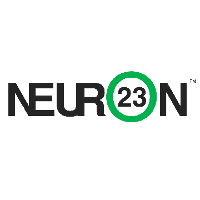NEULARK trial to evaluate NEU-411, a brain-penetrant, potent and selective LRRK2 inhibitor, in people with LRRK2-driven Parkinson’s disease; topline data anticipated in 2027
SOUTH SAN FRANCISCO, CA, USA I June 24, 2025 I
Neuron23® Inc., a clinical-stage biotechnology company focused on developing precision medicines for genetically defined neurological and immunological diseases, today announced the closing of a $96.5 million Series D financing round led by a healthcare investor, with significant support from existing investors Westlake Village BioPartners, SoftBank Vision Fund 2, Redmile Group, Blue Owl, Kleiner Perkins, HBM Healthcare Investments (Cayman) Ltd., and Acorn Bioventures. The Company also announced the first patient has been dosed in the global Phase 2 NEULARK clinical trial of NEU-411, a brain-penetrant, potent and selective inhibitor of LRRK2, in people with early Parkinson’s disease (PD).
“The Series D financing represents further endorsement of Neuron23’s industry-leading approach, which leverages state-of-the-art precision medicine and patient identification to deliver NEU-411 to people with Parkinson’s disease who are most likely to benefit from LRRK2 inhibition, increasing probability of success in the clinic and bringing the right therapy to the right patients,” said Nancy Stagliano, Ph.D., Chief Executive Officer of Neuron23.
“The dosing of the first patient in the NEULARK clinical trial marks a pivotal milestone in Parkinson’s disease research. For the first time, we are using a precision medicine approach to identify and enroll patients with LRRK2-driven disease,” said Dr. Aaron Ellenbogen, a movement disorders neurologist, Medical Director at Quest Research Institute, and NEULARK study investigator. “This trial’s design, incorporating a unique digital biomarker to frequently monitor disease progression, enables us to capture exceptionally precise, real-time data on both motor and non-motor symptoms, offering unparalleled insights into how the disease evolves. With multiple innovative elements cohesively working together in the NEULARK trial, we’re poised to take a significant step forward in the pursuit of effective treatments for Parkinson’s disease.”
The global Phase 2 NEULARK clinical trial (
NCT06680830
) is a randomized, double-blind, placebo-controlled study in people with early-stage, LRRK2-driven PD. The study will evaluate the efficacy, safety, pharmacokinetics and pharmacodynamics of orally administered NEU-411. The trial will enroll approximately 150 participants who will receive NEU-411 or placebo daily for a 52-week treatment period. The trial incorporates a smartphone equipped with proprietary software developed by Roche Information Solutions (RIS) that frequently measures PD symptoms such as movement and tremor, as well as non-motor symptoms such as cognition. The primary endpoint is the change from baseline in the Roche digital biomarker score compared to placebo. Secondary outcome measures include the Movement Disorder Society’s Unified Parkinson’s Disease Rating Scale (MDS-UPDRS), a widely recognized tool for evaluating Parkinson’s symptoms.
Neuron23 has partnered with Sano Genetics to streamline patient referrals and assist in the identification of people with PD who may be eligible to participate in the NEULARK clinical trial. Under a separate protocol, Sano is offering saliva test kits that can identify people with LRRK2-driven PD. Individuals identified will be referred to the nearest NEULARK clinical trial site for a complete eligibility evaluation and potential enrollment. More information can be found at
https://neulark.com
.
About LRRK2’s Role in Parkinson’s Disease and NEU-411
Mutations in the
LRRK2
gene are among the most common genetic causes of PD, affecting approximately 2% of people with the disease. Individuals who inherit gain-of-function mutations in LRRK2 are at higher risk of developing PD later in life. Importantly, there is a growing body of evidence that LRRK2 activity may play a role in a subset of the larger population of people without a family history of PD, known as idiopathic PD, suggesting that therapies targeting LRRK2 could be beneficial to a broader population than just individuals with rare, familial LRRK2 mutations.
Neuron23 has identified single-nucleotide polymorphisms (SNPs) – variations in an individual’s DNA sequence – that are predicted to drive LRRK2 overactivity in up to 30% of people with idiopathic PD. People with PD who have these SNPs, together with those who have
LRRK2
gene mutations, make up the population collectively referred to as LRRK2-driven PD and represent who Neuron23 believes is most likely to benefit from LRRK2 inhibition.
NEU-411 is a potent, highly selective and brain-penetrant oral LRRK2 inhibitor with best-in-class potential. By specifically inhibiting the overactive LRRK2 kinase pathway, NEU-411 aims to address an underlying cause of disease progression in people with LRRK2-driven PD, offering a more precise and potentially more effective approach compared to existing treatment options that only address some symptoms of PD.
About Parkinson’s Disease
Parkinson’s disease (PD) is a brain disorder that causes irregular movements, such as shaking, stiffness and difficulty with balance and coordination. Symptoms usually begin gradually and worsen over time. As the disease progresses, people may have difficulty walking and talking. Additional symptoms can include mental and behavioral changes, such as sleep problems, depression, memory difficulties and fatigue.
Some cases of PD appear to be hereditary, and a few cases can be traced to specific genetic mutations. Currently, there is no available cure or therapy that impacts underlying PD progression, and treatment options are only used to alleviate some symptoms.
About Neuron23®
Neuron23 Inc. is a clinical-stage biotechnology company focused on developing precision medicines for genetically defined neurological and immunological diseases. Neuron23 combines recent advances in human genetics with a state-of-the-art drug discovery and biomarker platform using advanced techniques in machine learning and artificial intelligence to advance therapeutics for devastating diseases. The Company’s focus areas are neurodegenerative diseases, neuroinflammatory diseases, and systemic autoimmune and inflammatory diseases. Founded in 2018, Neuron23 has assembled a world-class team of experts and entrepreneurs located in South San Francisco, CA. For more information, please visit
www.neuron23.com
, or follow us on
LinkedIn
and
X
(formerly Twitter).
SOURCE:
Neuron23






